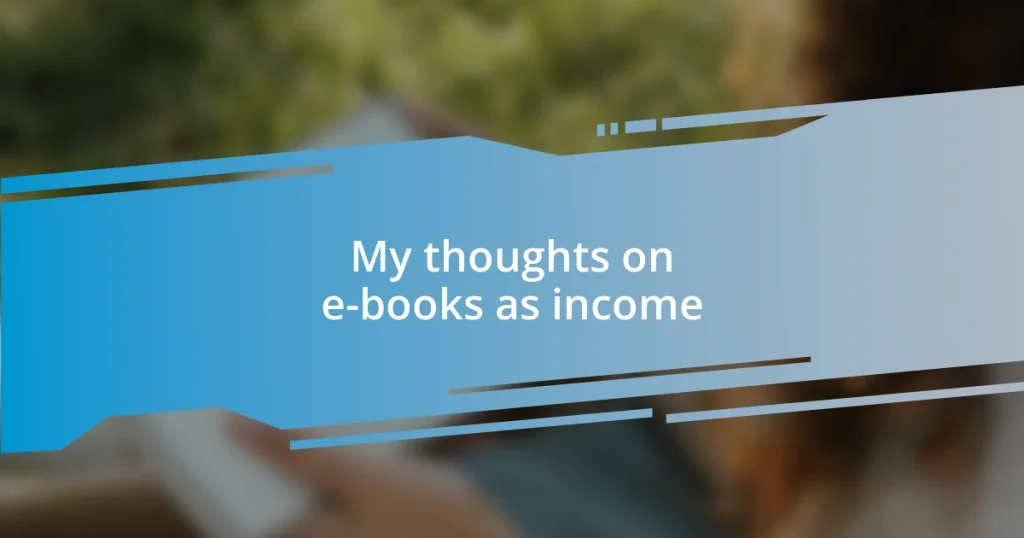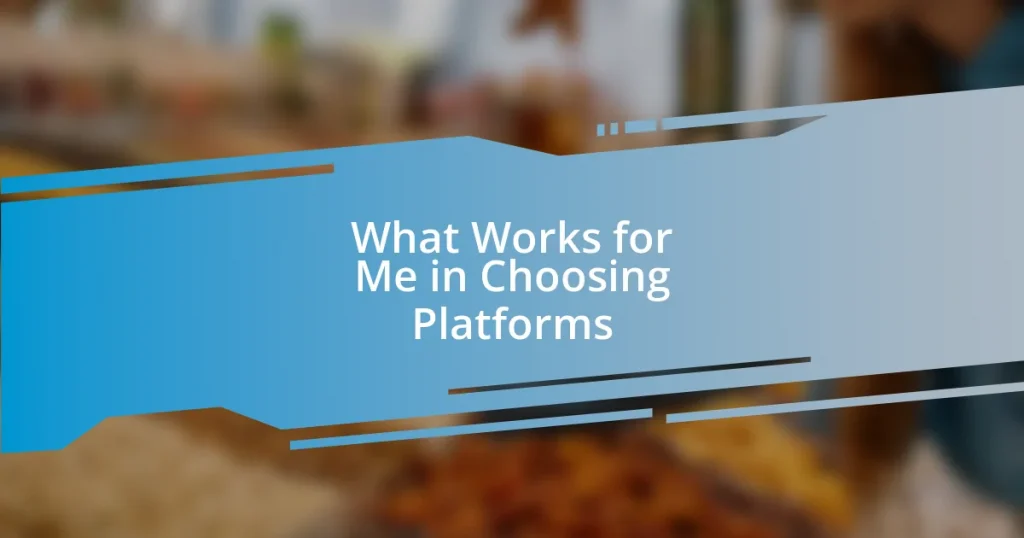Key takeaways:
- E-books offer passive income opportunities and cater to niche markets, allowing authors to monetize their expertise and passions with low production costs.
- Effective marketing strategies, including building an online presence and utilizing social media and email marketing, are crucial for engaging with readers and driving sales.
- Monetization options such as selling directly on personal websites, using e-book platforms, and exploring subscription models can enhance profit potential and foster reader relationships.
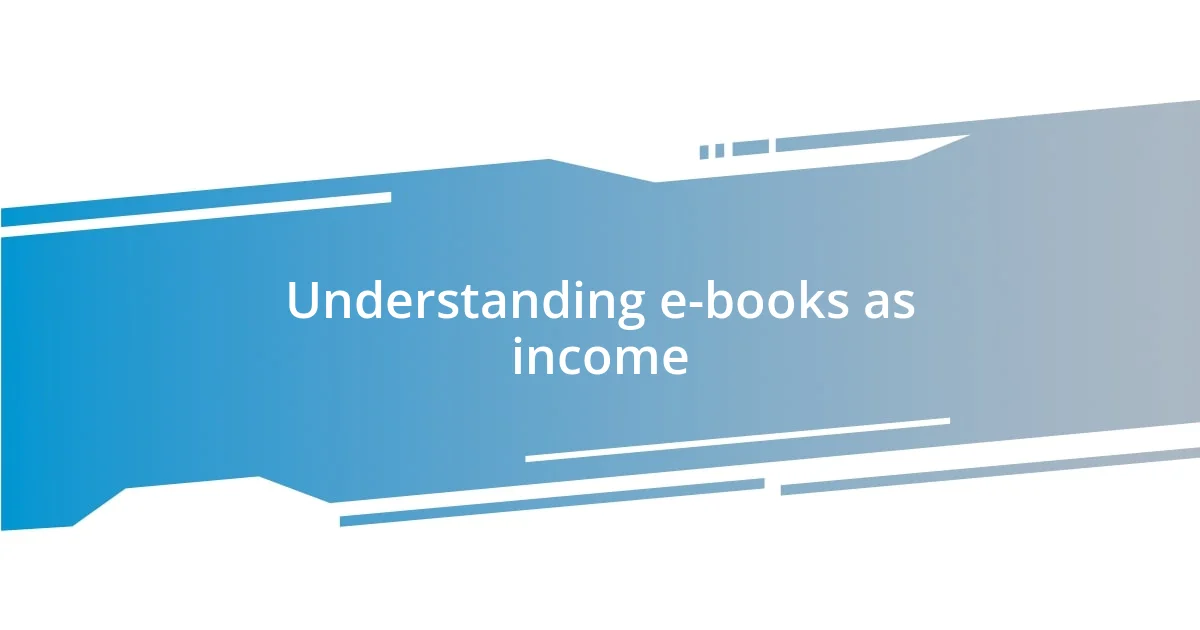
Understanding e-books as income
E-books represent an innovative avenue for generating income, and I can’t help but feel excited about their potential. I remember the thrill of publishing my first e-book and watching it gain traction—my thoughts were a whirlwind of disbelief and pride. What if that moment could be a stepping stone for countless others?
The beauty of e-books is their capacity for passive income. Once you’ve penned your thoughts and shaped them into a cohesive narrative, that work continues to earn money even when you’re not actively promoting it. Have you ever wondered how much time you spend consuming books that could instead work for you? Each page of an e-book holds the potential for ongoing revenue, and that’s incredibly liberating.
I’ve also seen firsthand how e-books can cater to niche audiences, creating a profitable market without needing to sell thousands of copies. For example, a friend of mine wrote about urban gardening, a topic close to his heart, and found a dedicated following. It’s fascinating to consider—what expertise or passion could you share that would resonate with others? Diving into the e-book world not only diversifies your income but can also allow your passions to flourish in a meaningful way.
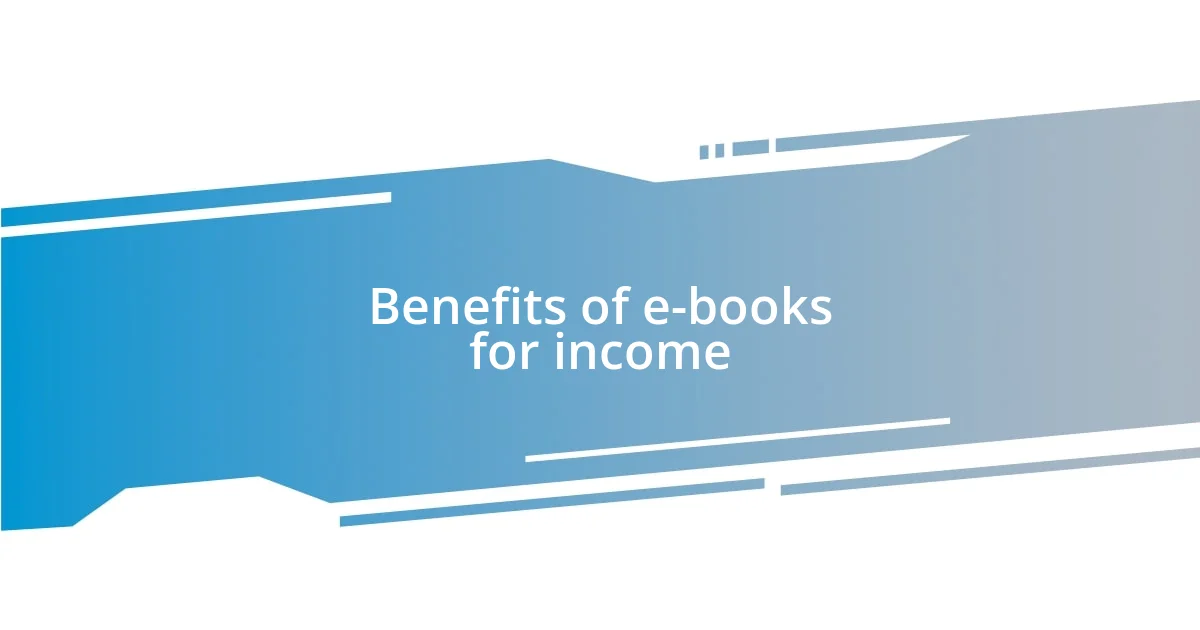
Benefits of e-books for income
The ease of distribution with e-books is one of the most appealing benefits in terms of income. I recall the excitement of clicking “publish” and realizing my work was instantly available to readers worldwide. Unlike printed books, which require inventory and shipping, e-books can be sold across various online platforms, allowing for a global reach without the logistical headaches. It’s amazing to think about how your words can cross borders while you enjoy a cup of coffee at home.
Consider these benefits of e-books for income:
– Low production costs: No printing or shipping expenses.
– Scalability: You can sell an unlimited number of copies without increasing overhead.
– Instant updates: Easily revise content based on reader feedback and current trends.
– Multiple formats: E-books can be formatted for different devices, broadening your audience.
– Automated sales: Set up systems to manage sales and delivery without your constant involvement, maximizing passive income.
When I first dipped my toe into e-publishing, I was surprised by the sheer freedom it offered. I remember how it felt to see my work transform into a source of income while I was sleeping, working, or even on a weekend getaway. The idea that my e-book could continue selling with minimal effort was exhilarating and made me eager to create more content. Each publication became not just another project but a building block toward financial independence and creative expression.
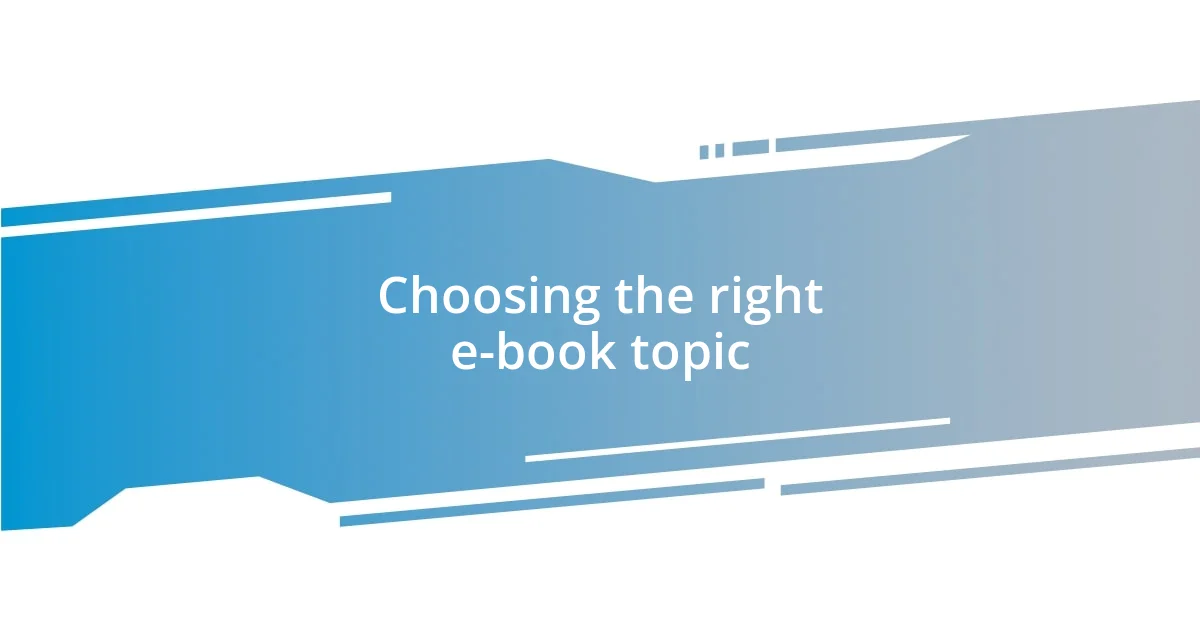
Choosing the right e-book topic
Choosing the right topic for your e-book can be a game-changer. I’ve learned that aligning your passion with market demand makes all the difference. For instance, I once considered writing about a hobby I enjoyed, but my research revealed that there was limited interest. This eye-opener pushed me to tap into my expertise in digital marketing instead, leading to a more successful launch.
Another factor to consider when choosing your e-book topic is your unique perspective. I often think about how my personal experiences shape my writing. This became apparent when I wrote an e-book sharing my journey through anxiety and how I learned to cope with it. The feedback I received was overwhelmingly positive, proving that people are not just looking for information but also for relatable stories that resonate with their own struggles.
Exploring niche markets can unlock surprising opportunities for success. I always advise aspiring authors to think outside the box. You might be surprised to find a devoted audience in areas that mainstream topics overlook. For example, I know someone who wrote extensively about minimalist living, and despite the niche, they created a vibrant community around it. The right topic can turn your e-book into a viable income stream while also touching the lives of others in a meaningful way.
| Factor | Insight |
|---|---|
| Passion vs. Market Demand | Aligning interests with popular topics increases potential sales. |
| Unique Perspective | Personal stories make e-books relatable and engaging for readers. |
| Niche Opportunities | Filling gaps in popular discussion can foster dedicated audiences. |
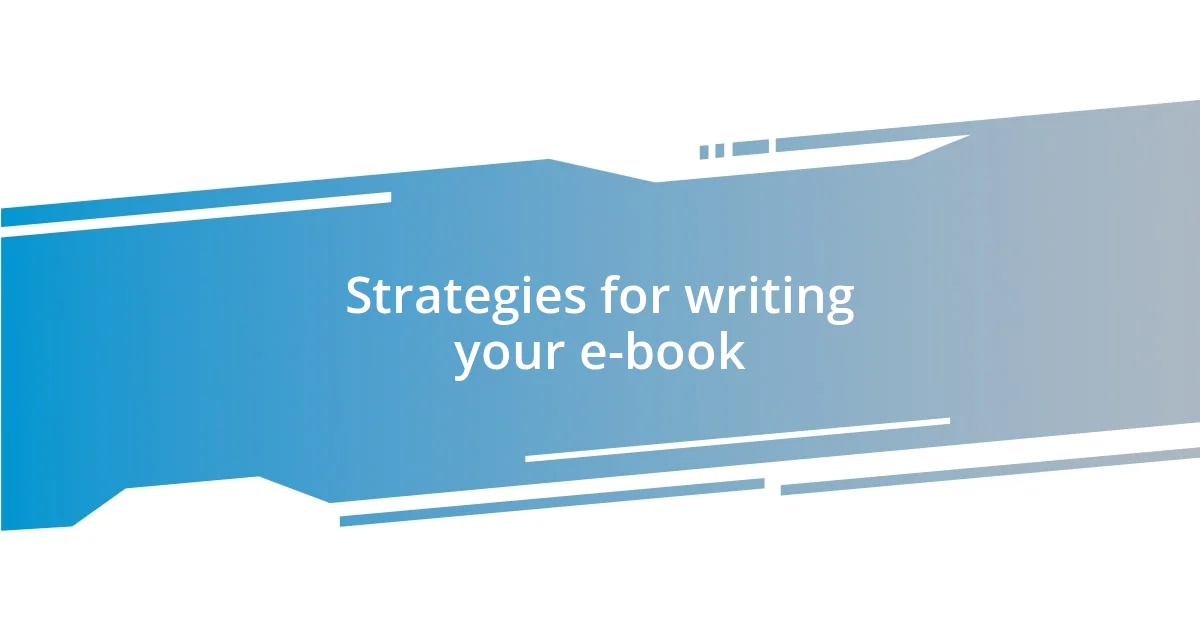
Strategies for writing your e-book
When it comes to writing your e-book, having a clear outline is essential. I remember the first time I faced a blank page, overwhelmed by possibilities. It was only when I drafted an outline that my thoughts started to flow coherently. Breaking your content down into sections not only helps in organizing your ideas but also allows you to tackle the writing process step by step.
Don’t skip the revision phase; I can’t stress this enough. The first draft is just that—a draft. There was a time I rushed to publish because I thought my content was good enough. After receiving critical feedback, I realized my initial version lacked clarity and depth. Embracing the revision process enabled me to refine my voice and strengthen my arguments, ultimately leading to a better product that resonated with readers.
Lastly, consider engaging with beta readers before your official release. I vividly recall the nervousness I felt when handing my draft to a few trusted friends. Their honest feedback provided insights I hadn’t considered, and it was enlightening to see how different readers interpreted my writing. Their suggestions helped elevate the quality of my e-book, and their excitement made the journey even more fulfilling. Have you ever thought about how beneficial it would be to see your work through someone else’s eyes?

Marketing your e-book effectively
Effective marketing of your e-book is crucial, and I can’t stress enough the importance of building a strong online presence. I remember when I first ventured into promoting my e-book; I created a simple blog to share insights and snippets from my writing. The moment I started engaging with my audience—answering comments and sharing behind-the-scenes stories—was when I truly began to see traction. Isn’t it amazing how a little interaction can turn readers into loyal fans?
Social media platforms can also serve as powerful tools to market your e-book effectively. Personally, I’ve found that visually engaging content, like tailored graphics or short videos, captures attention. I created a series of engaging posts around key themes of my e-book, which not only created buzz but also sparked meaningful conversations among followers. Have you considered how visual storytelling could amplify your message to potential readers?
Lastly, utilizing email marketing can be a game-changer in reaching your audience directly. I’ve seen remarkable results by offering a free chapter or exclusive content in exchange for email sign-ups. This strategy not only builds your mailing list but also fosters a sense of community. Reflecting back, the genuine connections I cultivated through thoughtful follow-ups turned casual subscribers into ardent supporters. How are you planning to engage your audience beyond the initial sale?
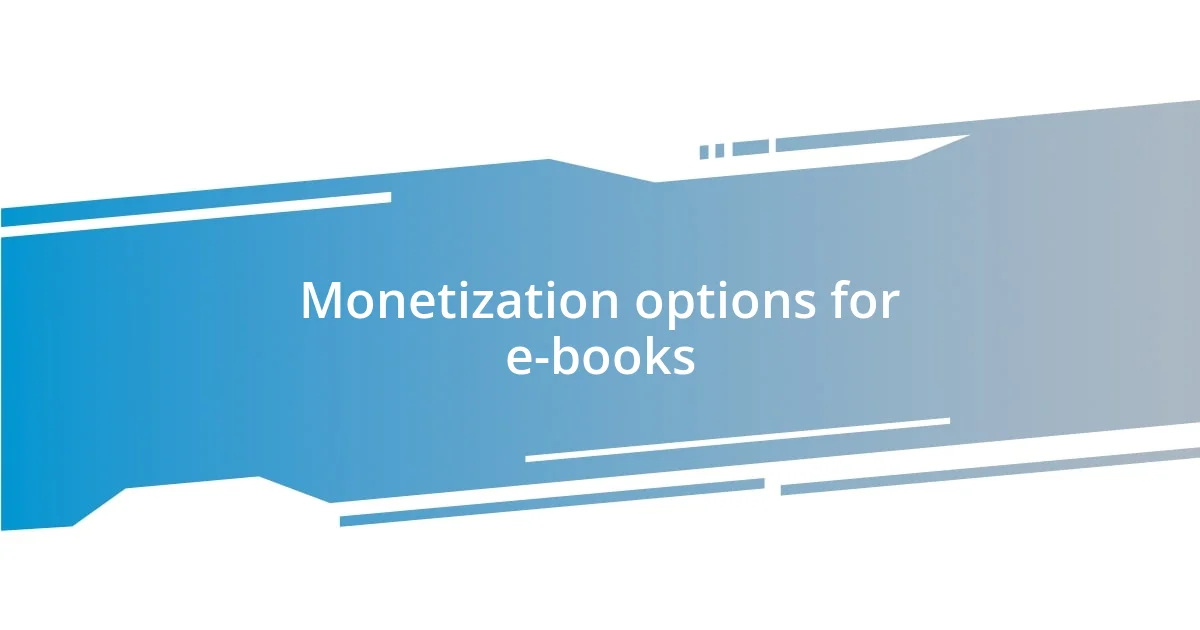
Monetization options for e-books
I’ve discovered that there are several effective monetization options for e-books that can really make a difference. Selling your e-book directly from your own website allows you to keep a larger share of the profits while cultivating a direct relationship with your readers. I remember when I first set up a PayPal link for my e-book—seeing those immediate sales notifications pop up was a rush! Have you thought about how an online shop connects you directly to your audience?
Another lucrative option is to publish through various e-book platforms like Amazon Kindle, Smashwords, or Apple Books. These platforms have massive reach, allowing you to tap into millions of potential readers. I once uploaded my work to multiple sites, and witnessing the different audience engagement was eye-opening. It truly highlighted how diverse the e-book market is. How do you plan to navigate these platforms to expand your readership?
Subscription models can also be incredibly effective. I’ve experimented with platforms that offer readers access to my e-books as part of a monthly subscription service. The steady income from these models is appealing, as it shifts focus from one-time sales to building long-term relationships with readers. Reflecting on this approach, I realized how it encourages me to consistently produce quality content that keeps my audience engaged. What would it mean for your writing career to have a reliable, recurring income source?











